January 8, 2017
by Carole Zangari -
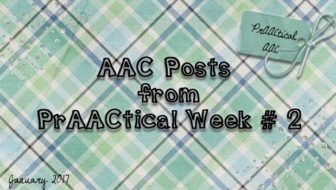
And the new year is off and running! Here are some posts you may have missed in your busy, AAC-filled week. Monday: PrAACtically January: AAC Resources for A Year of Core Words Wednesday: Video of the Week: Communication Strategies for Adolescents as They Transition through Adulthood Thursday: AAC and Emergent Literacy: 5 Posts with Implementation Ideas
Filed under: Featured Posts
Tagged With: summary post
January 5, 2017
by Carole Zangari -
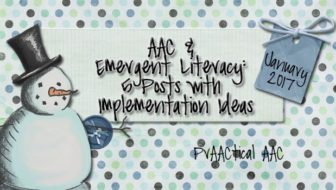
Looking to infuse additional activities to support the reading and writing development of the AAC learners with whom you work? Today, we’re revisiting some popular posts with helpful ideas and resources. Robust Literacy Instruction for People Who Use AAC A PrAACtical Literacy Activity for Beginning Communicators Literacy Lessons for Beginning AAC Learner Infusing Literacy Learning Opportunities in AAC Therapies Literacy for All: A Series of Videos by Dr. Caroline Musselwhite Hope you find some useful tips and suggestions.
Filed under: Featured Posts, PrAACtical Thinking
Tagged With: emergent literacy, implementation ideas, reading, writing
January 2, 2017
by Carole Zangari -
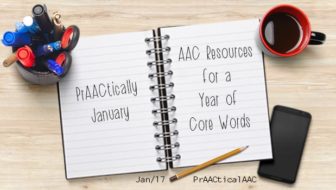
Happy 2017! As we welcome another prAACtical year, it’s time to start preparing the materials we’ll need to model and teach core words to our AAC learners. This is a great time to get the word cards and other materials for the Year of Words (Set 1/2013; Set 2/2014) ready to use with the AAC learners in our lives. Thanks to the generous spirit of PrAACtical AAC readers we have posts with a variety of resources: Minspeak/Unity version: Set 1/2013 PCS versions: Set 1/2013 , Set 2/2014 Speak for Yourself version: Set 2/2014 SymbolStix version: Set 1/2013 Lesson Pix: Set1/2013 Smarty Symbols: Set 1 words, Set 2 words CoughDrop: Set 1 words; Set 2 words WordPower: Set 1 words (Note: This is a large file that contains the resources for several versions of WordPower) Thanks to Brian Whitmer, Barbara Fernandes, Nancy Inman, Deborah Lesher, Beth Erwin, Bill and Lori Binko, Heidi LoStracco, Alison Wade,... [Read More...]
Filed under: Featured Posts, PrAACtical Thinking
Tagged With: A Year of Core Words, core words, PrAACtically January
January 1, 2017
by Carole Zangari -
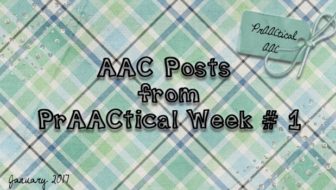
And just like that, the year is over. Ups and downs; Highs and lows. 2016 was anything but boring. Hope that 2017 is off to a great start for you and your prAACtical friends. Monday: Holiday Talk: AAC Conversations Using Partner-focused Questions Wednesday: Holiday Photos in AAC Learning: 3 Ideas for Using Them to Build Language Thursday: PrAACtical Teaching in the ASD Classroom: Predictable Chart Writing with Core Vocabulary
Filed under: Featured Posts
Tagged With: summary post
December 29, 2016
by Carole Zangari -
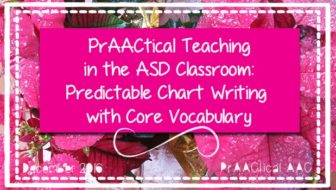
We are closing out the year with a bang by combining two of our favorite things: working on AAC and literacy. In this post, Michigan-based teachers Amy Devin and Lauren Pawlowski return to discuss their strategies for building communication skills in the context of writing activities. Enjoy their detailed descriptions of how they implement a 5-day writing sequence in their classrooms! :::::::::::::::::::::::::::::::::::::::::::::::::::::::::::::::: Predictable Chart Writing with Core Vocabulary If writing with your students is something you are apprehensive about, then Predictable Chart writing is a good place to start. You get a lot of bang for your buck, as you can work on many different concepts as you are instructing through the week. Some areas you will be able to work on is location and meaning of core, concepts about print, print awareness and fine motor skills. Prior to starting your Predictable Chart Writing, you have to have a plan on which... [Read More...]
Filed under: Featured Posts, PrAACtical Thinking
Tagged With: ASD, classroom, school, writing
December 28, 2016
by Carole Zangari -

Whether you celebrate Hanukkah, Christmas, Kwanzaa, or some combination of holidays, these events offer rich opportunities for building language in people who use AAC. There’s a good chance that someone took photos which can be a terrific source of motivating materials. In this post, we’ll look at a few ideas for using those to strengthen language and communication skills. Collect them into a photo album: Use PowerPoint, Keynote, or an app to pull the photos together into a collection that can serve as a highly motivating context for language learning activities. With these albums we can: Page through them together to practice making comments (e.g., cold; I see tree, That is pretty), Co-create a narrative about the picture, Work on morphological goals such as pluralization and verb tenses, and, Build longer sentences (e.g., ‘hot chocolate’ becomes ‘drink hot chocolate’ or ‘make more hot chocolate’). Create a photo collage: Work with the... [Read More...]
Filed under: Featured Posts, PrAACtical Thinking
Tagged With: implementation, language therapy, photo
December 26, 2016
by Carole Zangari -
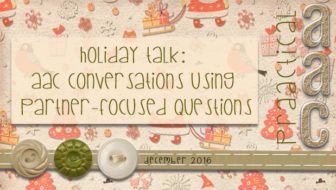
A great many AAC learners would love to be more actively involved in social conversations but may not have the skills to carry on a conversation. For some individuals, the use of pre-stored messages designed to get their partners talking is a great way take the pressure off and allow the AAC learner to be more actively involved in the conversation. Partner-focused questions serve to get information, opinions, or feedback. By creating these and storing them as whole questions, the AAC learner has a relatively quick and easy means to drive the direction of the conversation. Here are some examples: How were your holidays? What did you get for Christmas/Hanukkah? What do you think? Where did you go over break? How’s your family? What’s going on with you? In general, people love talking about themselves and questions like these are a great way to get the ball rolling or keeping... [Read More...]
Filed under: Featured Posts, PrAACtical Thinking
Tagged With: Conversation, holiday, language therapy, prestored messages
December 25, 2016
by Carole Zangari -
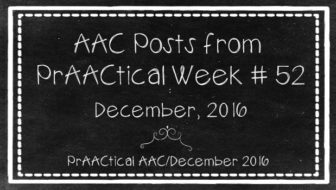
Hoping you are enjoying the holiday season with friends and family. Here are some posts that may be of interest. Monday: Selecting AAC Apps & Devices: A Handful of Reasons Not to Skip the Trial Period Wednesday: Video of the Week: Implementing Object-based Schedules in the Classroom Thursday: AAC Apps and Devices: Thoughts on Conducting AAC Trials Friday: An AAC Christmas Carol
Filed under: Featured Posts, PrAACtical Thinking
Tagged With: summary post
December 23, 2016
by Carole Zangari -
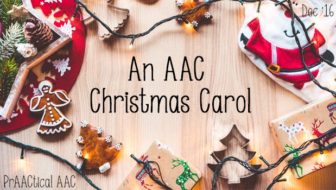
A very happy holiday from me to you.
Filed under: Featured Posts, PrAACtical Thinking
December 22, 2016
by Carole Zangari -
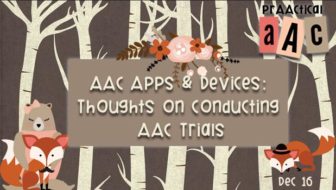
In an earlier post, we talked about why a period of trial use with multiple AAC devices and/or apps is an important part of the process of selecting a communication tool. As with test driving a car prior to purchasing it, giving clients an opportunity to use the AAC options that have the features they need allows us to better determine whether it is likely to meet their needs and expectations. Few of us would purchase a car without taking it out for a spin. It makes a lot of sense, but what does the ‘test drive’ equivalent look like in AAC? What makes for a fair and reasonable period of trial use when we’re trying out an SGD or AAC app? Here are some thoughts to get us started. Clarify the primary purpose of the trial, which generally involves determining a) whether the person can actually utilize it, and... [Read More...]
Filed under: Featured Posts, PrAACtical Thinking
Tagged With: device trials









